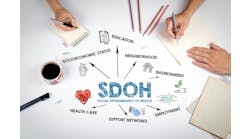Developing and harmonizing measures for social determinants of health (SDOH) is a huge challenge for health systems seeking to assess the impact of their efforts. During a July 11 meeting held by the National Quality Forum, Matthew Stiefel, senior director of the Center for Population Health at Kaiser Permanente, noted that the Gravity Project housed at the University of California San Francisco (UCSF) is providing an important contribution in this domain by focusing on coding and standardization of measures.
On Aug. 20, HL7 and the American Academy of Family Physicians (AAFP) announced that the Gravity Project is now part of the HL7 FHIR Accelerator Program, which is designed to assist implementers in creating implementation guides and other products than can facilitate FHIR acceleration and adoption activities. Other projects within the Accelerator Program include Argonaut, Da Vinci and CARIN Alliance.
The Gravity Project aims to standardize medical codes to facilitate the use of social determinants of health-related data in patient care, care coordination between the health and human services sectors, population health management, value-based payment and clinical research.
The Social Interventions Research and Evaluation Network (SIREN) at the Center for Health and Community at UCSF was an early catalyst of the Gravity Project, convening a diverse group of stakeholders as early as November 2017 to develop a strategy for achieving consensus-based comprehensive coding standards for SDOH data capture in EHR systems.
“With funding from the Robert Wood Johnson Foundation and in partnership with EMI Advisors LLC, SIREN is pleased to be working with multiple stakeholders to meet the rapidly expanding market needs around SDOH data documentation and interoperability,” said SIREN Director and UCSF Associate Professor of Family and Community Medicine, Laura Gottlieb, M.D., M.P.H., in a statement. “Building on work originally supported by Kaiser Permanente and the Robert Wood Johnson Foundation, the Gravity Project’s new partnership with HL7 will strengthen the capacity for SDOH information exchange between stakeholders, including clinical providers, patients, community organizations and payers.”
The Gravity Project has established a public collaborative process initially focused on three domains: food security, housing stability and quality, and transportation access. The project is working to:
- Develop use cases to support documentation for screening, diagnosis, treatment/intervention, and planning activities within EHR and related systems;
- Identify common data elements and their associated value sets to support the uses cases;
- Develop a consensus-based set of recommendations on how best to capture and group these data elements for interoperable electronic exchange and aggregation; and
- Develop a FHIR Implementation Guide based on the defined use cases and associated data sets.
The AAFP is acting as a convener for the Gravity Project and supporting information interoperability efforts, said Shawn Martin, senior vice president of advocacy, practice advancement and policy for the American Academy of Family Physicians. “Our vision is to transform health care by addressing the social determinants of health through efforts such as our innovative HealthLandscape geoanalytics platform and The EveryONE Project to help family physicians take action and confront health disparities head-on,” he said in a statement.
The Blue Cross Blue Shield Association (BCBSA) has joined SIREN and AmeriHealth Caritas in co-sponsoring the Gravity Project launch. Both the BCBS System and AmeriHealth Caritas have several programs in place to address SDOH, including actively collecting SDOH health data, engaging community health workers, providing rides to doctor appointments, and delivering healthy, affordable meals to people’s homes.
The Gravity Project has convened more than 500 experts from across the nation including clinical and community-based provider groups and payers to health technology developers and standards stewards, to collaboratively develop recommendations for how best to capture data about food, housing, and transportation risks and needs, for interoperable electronic health information exchange.
Participation in the Gravity Project is open to all interested organizations and individuals. Visit the HL7 Confluence page to learn more about the Gravity Project, including how to become a participant and/or a sponsor

